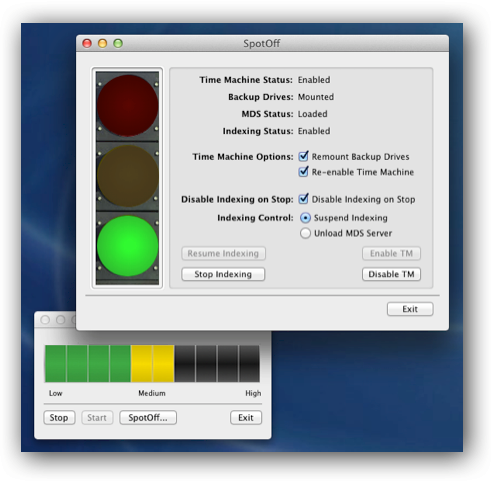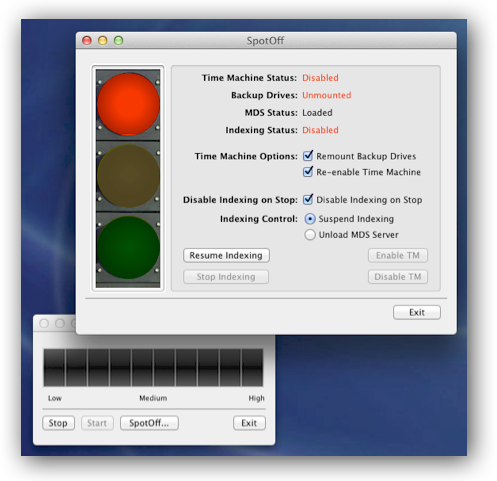Introducing SpotOff 2 with Spot-O-Meter 2 and
Spot-O-Meter Mini for Mac OS X
Performance problems with a Mac can seem to be mysterious at
times. The system that was running at high speed suddenly comes
to a crawl for no apparent reason. Web pages that loaded in a
second now take ten seconds. Fans kick on at high speed. Laptops
become hot. Applications that used to pop up now leave you
sitting there, watching a spinning beach ball rotate as it takes
thirty or more seconds to load. This leaves the user asking
"What's going on???"
Since MacOS 10.4 (Tiger), the operating system includes a pesky
little process named "mds," which stands for meta data server.
When this process becomes active, it can use nearly all your CPU
power, put a heavy load on the drives, and hog so many resources
it leaves other applications waiting.....and waiting......and
waiting.
The mds process is used primarily by Spotlight and Time Machine,
but a few other consumer apps can also use it. When mds goes
into full indexing mode, it starts indexing everything it's
allowed to on every drive, and in the case of Time Machine, it
can't be stopped by normal user commands. Spotlight and Time
Machine use the mds process, to index different things. If a
user attempts to control Spotlight indexing alone, they may very
well find that the problems still persist for what seem to be
inexplicable reasons.
The end result is exactly as we described in the first
paragraph.
SpotOff 2 is a Spotlight and Time
Machine meta data server (mds) controller that allows a
user to activate and de-activate mds indexing on a Mac OS X
system. Spot-O-Meter 2 is an application available with
SpotOff 2 or as a free download (see below) that
displays indexing activity via an easy to use interface.
It is not uncommon for users to experience the following
symptoms when mds has “run amok”:
- Applications that normally complete quickly now take much longer...sometimes as much as four times longer!
- Web access slows down considerably.
- Laptops may become hotter than normal, often kicking on fans at high speed
- Games may become “jerky” due to CPU cycles being taken away from them.
- Videos, either online or on DVD seem to have unexplainable pauses in them.
- Battery consumption on laptops seems to degrade at a much higher rate than normal.
When indexing is intense, mds demands a considerable amount of
CPU and I/O resources, which are in turn taken away from any
other applications running on the system. We’ve seen
situations where the mds process may consistently use between
50% to 95% of the computing power of a system for hours on end!
SpotOff 2 allows a user to to do the following to bring
mds indexing under control:
- Disable and re-enable mds indexing by suspending and resuming it
- Unloading and re-loading the mds process itself
- Provide Time Machine control that is specific to mds indexing
Each of these tactics has it’s own advantages and disadvantages,
which are described in the users manual. If indexing is
suspended or the mds process is unloaded, it will remain that
way, even between reboots. Indexing can now be brought under
control, and users can allow it to occur when it’s convenient,
rather than occurring while you're using the system.
If you have some critical work to do, or you’re going to do
something and you don’t want to be bothered by the delays mds
indexing can cause, SpotOff 2 may be the solution you’ve
been waiting for. If you suspect you’re suffering from some of
the side effects of mds indexing but aren’t sure, you can find
out by downloading the FREE copy of Spot-O-Meter 2 which
can tell you if and when mds indexing is occurring.
NOTE: SpotOff 2 requires administrative access to use,
whereas Spot-O-Meter 2 and Spot-O-Meter Mini do
not.
Tech Support Note: The packaged bundle of SpotOff 2 with
Spot-O-Meter 2 and Spot-O-Meter Mini for Mac
OS X is fully supported by SCSC, however the free download of Spot-O-Meter
2 and Spot-O-Meter Mini for Mac OS X is not. There
is, however, very little that can go wrong with either Spot-O-Meter
versions.
The following two images show SpotOff 2 and the standard
version of Spot-O-Meter 2 in use. In the first
image, mds indexing is fairly intense (yellow zone) as indicated
by Spot-O-Meter and SpotOff 2 indicates that
indexing is enabled (green light on the stoplight). In the
second image, SpotOff 2 has suspended mds indexing
as indicated by the red stop light, and Spot-O-Meter 2
is showing no activity at all. SpofOff has successfully
allowed the user to run their system at full speed without any
mds intrusion!


System Requirements
SpotOff 2 and Spot-O-Meter 2 support
MacOS® versions 10.6 (Snow Leopard), 10.7(Lion), 10.8 (Mountain
Lion), 10.9 (Mavericks), 10.10 (Yosemite), and 10.11 (El
Capitan) on Intel platforms. Supported Intel based systems
include all variants of the MacBook, MacBook Air, MacBook Pro,
iMac, Mac Pro, and Mac Mini.
Obtaining SpotOff 2 with Spot-O-Meter 2 for Mac OS X
To purchase SpotOff 2 with Spot-O-Meter 2, click on the
Buy SpotOff Now button below. To download a free
standalone promotional copy of Spot-O-Meter for Mac OS X,
click on the Get Spot-O-Meter button below.
Prices:
$10.95 For SpotOff 2
with Spot-O-Meter 2 for Mac OS X

